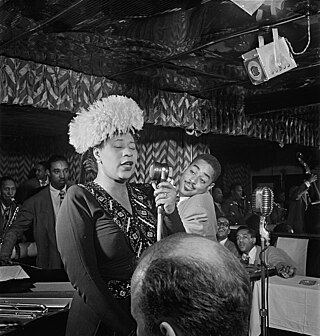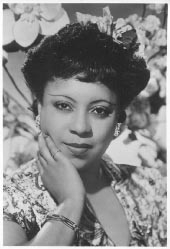Related Research Articles

Edward Kennedy "Duke" Ellington was an American jazz pianist, composer, and leader of his eponymous jazz orchestra from 1923 through the rest of his life.

In vocal jazz, scat singing is vocal improvisation with wordless vocables, nonsense syllables or without words at all. In scat singing, the singer improvises melodies and rhythms using the voice as an instrument rather than a speaking medium. This is different from vocalese, which uses recognizable lyrics that are sung to pre-existing instrumental solos.

The Cotton Club was a New York City nightclub from 1923 to 1940. It was located on 142nd Street and Lenox Avenue (1923–1936), then briefly in the midtown Theater District (1936–1940). The club operated during the United States' era of Prohibition and Jim Crow era racial segregation. Black people initially could not patronize the Cotton Club, but the venue featured many of the most popular black entertainers of the era, including musicians Fletcher Henderson, Duke Ellington, Jimmie Lunceford, Chick Webb, Louis Armstrong, Count Basie, Fats Waller, Willie Bryant; vocalists Adelaide Hall, Ethel Waters, Cab Calloway, Bessie Smith, Aida Ward, Avon Long, the Dandridge Sisters, the Will Vodery Choir, The Mills Brothers, Nina Mae McKinney, Billie Holiday, Midge Williams, Lena Horne, and dancers such as Katherine Dunham, Bill Robinson, The Nicholas Brothers, Charles 'Honi' Coles, Leonard Reed, Stepin Fetchit, the Berry Brothers, The Four Step Brothers, Jeni Le Gon and Earl Snakehips Tucker.

Dorothy Fields was an American librettist and lyricist. She wrote over 400 songs for Broadway musicals and films. Her best-known pieces include "The Way You Look Tonight" (1936), "A Fine Romance" (1936), "On the Sunny Side of the Street" (1930), "Don't Blame Me" (1948), "Pick Yourself Up" (1936), "I'm in the Mood for Love" (1935), "You Couldn't Be Cuter" (1938) and "Big Spender" (1966). Throughout her career, she collaborated with various influential figures in the American musical theater, including Jerome Kern, Cy Coleman, Irving Berlin, and Jimmy McHugh. Along with Ann Ronell, Dana Suesse, Bernice Petkere, and Kay Swift, she was one of the first successful Tin Pan Alley and Hollywood female songwriters.
James Francis McHugh was an American composer. One of the most prolific songwriters from the 1920s to the 1950s, he is credited with over 500 songs. His songs were recorded by many artists, including Chet Baker, June Christy, Bing Crosby, Deanna Durbin, Ella Fitzgerald, Judy Garland, Adelaide Hall, Billie Holiday, Beverly Kenney, Bill Kenny, Peggy Lee, Carmen Miranda, Nina Simone, Frank Sinatra, and Dinah Washington.

Noble Lee Sissle was an American jazz composer, lyricist, bandleader, singer, and playwright, best known for the Broadway musical Shuffle Along (1921), and its hit song "I'm Just Wild About Harry".
Theatre Owners Booking Association, or T.O.B.A., was the vaudeville circuit for African American performers in the 1920s. The theaters mostly had white owners, though there were exceptions, including the recently restored Morton Theater in Athens, Georgia, originally operated by "Pinky" Monroe Morton, and Douglass Theatre in Macon, Georgia owned and operated by Charles Henry Douglass. Theater owners booked jazz and blues musicians and singers, comedians, and other performers, including the classically trained, such as operatic soprano Sissieretta Jones, known as "The Black Patti", for black audiences.

Adelaide Louise Hall was an American-born UK-based jazz singer and entertainer. Her long career spanned more than 70 years from 1921 until her death and she was a major figure in the Harlem Renaissance. Hall entered the Guinness Book of World Records in 2003 as the world's most enduring recording artist, having released material over eight consecutive decades. She performed with major artists such as Art Tatum, Ethel Waters, Josephine Baker, Louis Armstrong, Lena Horne, Cab Calloway, Fela Sowande, Rudy Vallee, and Jools Holland, and recorded as a jazz singer with Duke Ellington and with Fats Waller.
Lew Leslie was an American writer and producer of Broadway shows. Leslie got his start in show business in vaudeville in his early twenties. Although white, he was the first major impresario to present African-American artists on the Broadway stage. He had two well-known wives, torch singer Belle Baker and Ziegfeld Follies showgirl Irene Wales.

The Lafayette Theatre(1912–1951), known locally as "the House Beautiful", was one of the most famous theaters in Harlem. It was an entertainment venue located at 132nd Street and 7th Avenue in Harlem, New York. The structure was demolished in 2013.

"I Can't Give You Anything but Love, Baby" is an American popular song and jazz standard by Jimmy McHugh (music) and Dorothy Fields (lyrics). The song was introduced by Adelaide Hall at Les Ambassadeurs Club in New York in January 1928 in Lew Leslie's Blackbird Revue, which opened on Broadway later that year as the highly successful Blackbirds of 1928, wherein it was performed by Adelaide Hall, Aida Ward, and Willard McLean.
Samuel David Wooding was an American jazz pianist, arranger and bandleader living and performing in Europe and the United States.

"Ill Wind " is a song composed by Harold Arlen with lyrics by Ted Koehler. It was written for their last show at the Cotton Club in 1934 and was sung by Adelaide Hall In an interview, Adelaide Hall explained how she performed the song to great effect during the show:
I starred in the Cotton Club Parade where I sang "Ill Wind," which Harold Arlen had written for me. There were twenty-four girl dancers behind me all dressed in grey and I was in pink. It was the first show ever that had nitrogen smoke rise from the floor on stage.

Blackbirds of 1928 was a hit Broadway musical revue that starred Adelaide Hall, Bill Bojangles Robinson, Tim Moore and Aida Ward, with music by Jimmy McHugh and lyrics by Dorothy Fields. It contained the hit songs "Diga Diga Do", the duo's first hit, "I Can't Give You Anything But Love", "Bandanna Babies" and "I Must Have That Man" all sung by Hall.

Eastbourne Performance is a live album by the American pianist, composer and band leader Duke Ellington, featuring his concerts at the Congress Theatre in Eastbourne, England, in December 1973. It was released on the RCA label in 1975. It is his last concert to have been commercially released.

Sing to the Moon is the debut studio album by English singer Laura Mvula. It was released on 1 March 2013 by RCA Victor. The album includes the singles "She" and "Green Garden". The album debuted at number nine on the UK Albums Chart. It was nominated for the 2013 Mercury Prize.
Aida Ward was an American jazz singer. Born in Washington, D.C., Ward rose to fame in the 1920s and 1930s in New York, on Broadway and at Harlem's Cotton Club. She appeared alongside Adelaide Hall and Bill "Bojangles" Robinson in the hit Broadway musical revue Blackbirds of 1928.
The Chocolate Kiddies is a three-act Broadway-styled revue that, in its inaugural production – from May to September 1925 – toured Berlin, Hamburg, Stockholm, and Copenhagen. The show never actually performed on Broadway, but was conceived, assembled, and rehearsed there. Chocolate Kiddies commissioned new works, but was also an amalgamation and adaptation of several leading African American acts in New York, specifically Harlem, intended to showcase exemplary jazz and African American artistry of the Harlem Renaissance. Early jazz was uniquely American; and, while New Orleans enjoys popularity for being its birthplace, the jazz emerging from Harlem during the Renaissance had, on its own merits, captured international intrigue.
References
- A. H. Lawrence, Duke Ellington and His World (London: Routledge, 2001), p. 112. ISBN 978-0-415-93012-3.
- Williams, Iain Cameron, Underneath A Harlem Moon ... the Harlem to Paris Years of Adelaide Hall, Chapter 8. ISBN 0826458939.